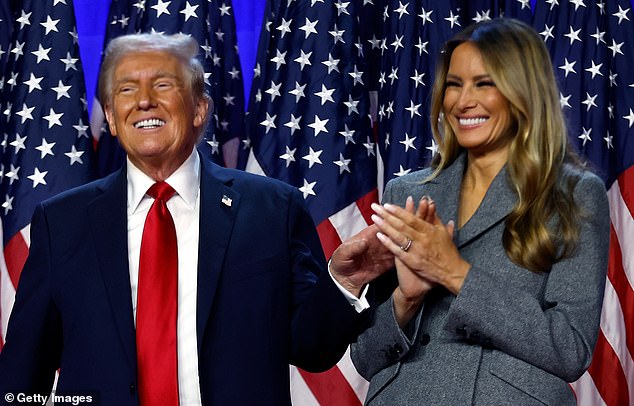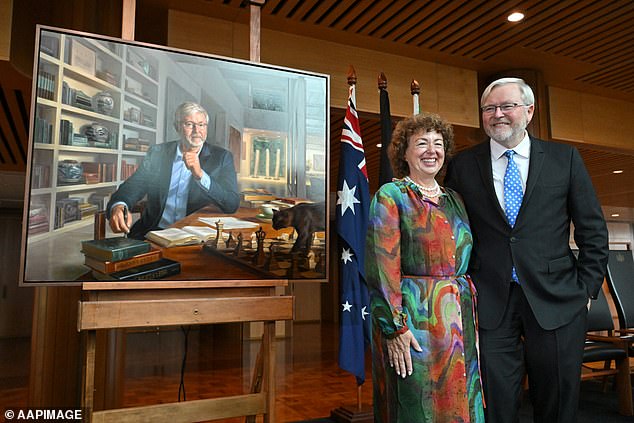The federal government has vigorously defended Australia’s under-fire ambassador to the United States, former prime minister Kevin Rudd.
Rudd has been under increasing pressure since Donald Trump, whom he had called a “village idiot” and “incoherent”, won the US presidential election last week.
During the election campaign, when asked about some of the “horrible things” Rudd had said about him, Trump said he “won’t be around long if that’s the case.”
‘I don’t know much about him. I heard it was a bit unpleasant. I’ve heard it’s not the brightest bulb. If he is hostile, he won’t be there for long.
One of Trump’s top advisers, Dan Scavino Jr, this week posted a GIF of sand falling through an hourglass alongside a post of Rudd renouncing some of his previous social media posts about the president-elect, in an ominous clue as to how the former Prime Minister’s statements have been received in the US.
But Trump is not allowed to choose who Australia sends to Washington as ambassador: Australia’s federal government does.
“Former Prime Minister Rudd is a very effective ambassador,” a Department of Foreign Affairs and Trade spokesperson told Daily Mail Australia.
“He is recognized throughout the Australian Parliament as having done excellent work in promoting Australia’s interests in the United States.”
Prime Minister Anthony Albanese also defended Rudd, saying he “is doing an excellent job as Australia’s ambassador to the United States.”
Australian ambassador to the United States, Kevin Rudd (right) and his wife Thérèse Rein, pictured at the unveiling of his official portrait in Parliament in Canberra.
Albanese added that “the fact that we have appointed a former prime minister speaks volumes about how important we consider the relationship with the United States.”
But Rudd seemed surprised when Trump won the US election and, just hours after the results were announced, deleted his previous critical posts about the incoming president on X.
In a statement, Rudd’s office said: ‘In his previous role as head of a US-based independent think tank, Rudd was a frequent commentator on US politics.
‘Out of respect for the office of President of the United States, and following the election of President Trump, Ambassador Rudd has removed these past comments from his personal website and social media channels.
“This has been done to eliminate the possibility of such comments being misinterpreted as reflecting his positions as Ambassador and, by extension, the views of the Australian Government.”
The government’s concern about the implications of Rudd having to deal with an American president who doesn’t want him there has also drawn Foreign Minister Penny Wong into the debate.

Rudd has been under increasing pressure since Donald Trump, whom he had regularly criticized, won the US presidential election last week. Donald and Melania Trump in the photo.
“I have confidence, continued confidence in Kevin (Rudd),” he told Sky News. “Kevin has been an exceptional ambassador and I am sure he will continue to be so.”
However, he admitted that the next American president has big plans for the next four years.
“President Trump campaigned for change, so we shouldn’t be surprised if there are changes,” Ms Wong said.
“We must be confident in our ability to work together to advance Australia’s interests.”
Amid concerns about how Trump’s plans to impose high tariffs on imports will affect Australia, the president-elect offered a friendly greeting in a phone call with Albanese last week.
Trump, who will be sworn in for his second term as president on January 20, told the Prime Minister: “We’re going to be perfect friends.”
The call, held around 10am Canberra time on Thursday, was the first between the two since Trump defeated Kamala Harris in the US election.
The Labor government said the call to Albanese was one of the president-elect’s first to a world leader after Trump’s decisive victory.
On the call, the incoming president emphasized the importance of a strong and lasting relationship between the United States and Australia.
The Prime Minister spoke about the $368 billion AUKUS nuclear submarine deal and noted that the United States had a trade surplus with Australia.
This last point could be crucial, as Trump’s promise to impose a 60 percent tariff on Chinese imports is a major concern for the Albanian government.
Any blow to China, which is Australia’s largest trading partner, will likely have consequences in Australia.
“A renewed US-China trade war is bad for the US and Chinese economies,” said analysts at Commonwealth Bank of Australia.
“And what’s bad for China is bad for Australia, Korea and New Zealand because of their high exposure to Chinese domestic demand.”
But before Australia has to deal with the fallout from Trump’s tariff regime, it has to consider whether or not it is worth keeping a US ambassador who has previously been a thorn in the side of the incoming US president.


